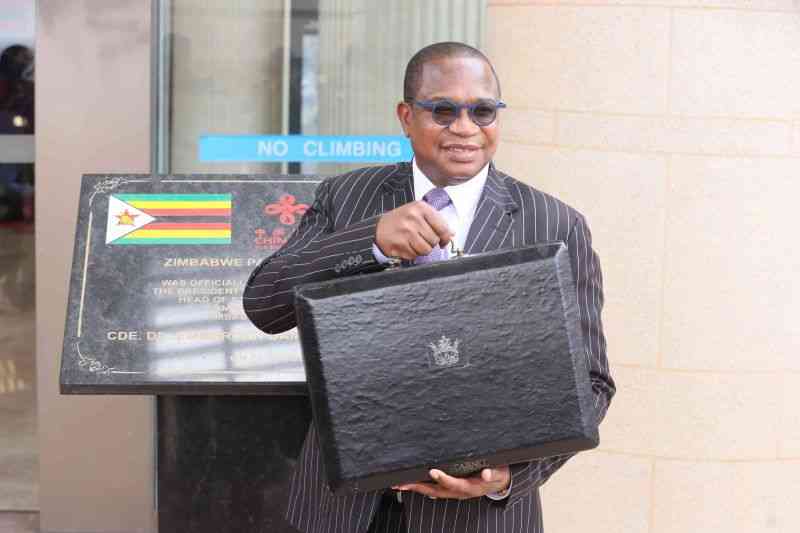
On November 30, 2023, in the bustling halls of the new Parliament building in Mt Hampden, Finance, Economic Development and Investment Promotion minister Mthuli Ncube , a proud holder of a diplomatic passport courtesy of the taxpayer, walked in to announce a "shocker."
Ncube, who like other ministers and top government officials, travels across the world on State and personal business, thanks to the red passport he holds, had bad news for Zimbabweans who do not have ordinary passports.
As he walked into the Parliament building with the proposed budget in hand, little did ordinary Zimbabweans know that Ncube was about to douse their hopes of ever being holders of ordinary passports.
The Parliament air crackled with a peculiar mix of outrage and intrigue over his "anti-poor" budget that saw him announce that fees for an ordinary passport would go up to US$200 from U$120.
He pegged an emergency passport at US$300.
This has had a boomerang effect and the people are not happy.
Ncube, a renowned economist who has stayed out of the country for dozens of years, attracted public criticism including from his colleagues in Zanu PF.
But Ncube, a man known for his unorthodox solutions to the country’s multifaceted socio-economic crisis, claimed to have a vision with his new passport fees.
- Interview: ‘Zim committed to tackling climate change’
- Finance minister reminded of PWDs
- Passport office contractor in row over payments
- New political party surfaces
Keep Reading
He dreamt of a future where Zimbabwe's borders pulsed with the efficiency of a futuristic sci-fi film.
He imagined unmanned checkpoints where e-passports, embedded with tiny chips, would grant access with a mere blink of the scanner.
No queues, no bribes, just a seamless glide into foreign land.
"It is the kind of thinking to say we need resources," Ncube declared, his voice echoing through the chamber.
He explained how the new fees would fund his ambitious modernisation project with a view of placing Zimbabwe at the forefront of technological advancement.
“It is just that when we were having the discussions about modernising our borders, we wanted to be the first country or city outside Dubai to have an unmanned border post where you can walk in because now we have an e-passport with a chip in it,” he said.
“You can walk in and the gates open, your passport is read. You do not talk to anybody. We want that equipment here by the end of 2024. We have to be modern.
“That is what motivated us. It is the kind of thinking to say we need resources to support the Ministry of Home Affairs and we thought that increasing passport (fees) was one way to do this.”
However, he was forced to back down after Zanu PF legislators rejected his passport fee hike proposal.
A number of Zanu PF MPs saw Ncube's vision as a pipe dream, a mirage shimmering in the desert of economic hardships.
Zanu PF chief whip, Pupurai Togarepi, who is also Gutu South MP, said the government must adopt a three-tier system on the issuance of passports to ensure every Zimbabwean has access to the travel document.
“I have no problem with us charging economic fees on passports but I was going to recommend, despite that I support the issue of increasing, but it must then be proportional not in a way that would discourage people from getting a right,” he said.
“Having an identity document is a right.”
Zimbabwe's passport is the most expensive in the region.
A number of ordinary citizens who spoke to NewsDay said the exorbitant fee piled more woes to their life of misery.
"It's ridiculous," fumed Tatenda Mhlanga, who had been queuing at the passport office in Harare since 4am on Monday.
"I'm a single mother, barely making ends meet. How am I supposed to afford this new fee? I just want to visit my sister in South Africa, not emigrate!"
Many Zimbabweans rely on cross-border trade and remittances from relatives abroad for survival.
The proposed new fee threatens to cut off this vital lifeline.
A number of Zimbabweans, professionals and unskilled, want to acquire passports to escape the country’s never-ending economic crisis.
"This feels like a punishment," said Tariro Chiremba, clutching a worn-out copy of her birth certificate.
"So many people are leaving for South Africa, the UK, anywhere with a better chance. Now, even getting out seems like a luxury."
In 2023 alone, over 100 000 Zimbabweans emigrated to South Africa, with a significant number heading to the United Kingdom.
This exodus is driven by economic hardships and lack of job opportunities.
As the clock ticks to January, the queues at passport offices have been growing longer.
Social commentator Pardon Taodzera said Ncube was divorced from the lived realities of ordinary struggling Zimbabweans.
“The government's decision to price out its own citizens from the right to travel raises serious concerns about its priorities and its understanding of the plight of ordinary Zimbabweans,” Taodzera said.
“Only time will tell if this policy will generate the desired revenue or simply slam the door shut on the fading dreams of a nation on the move.”










